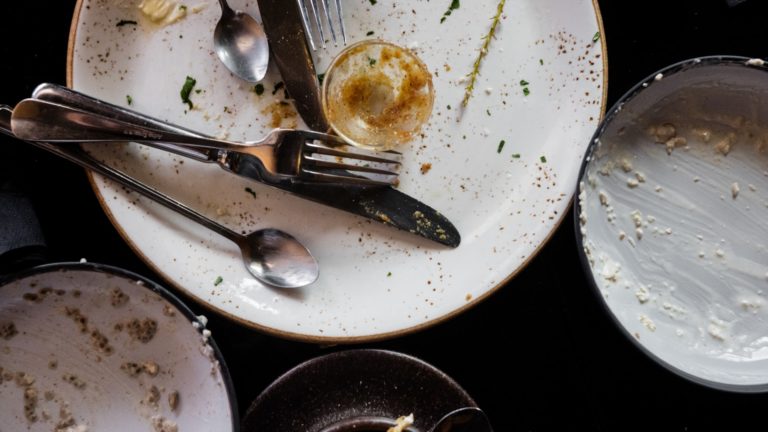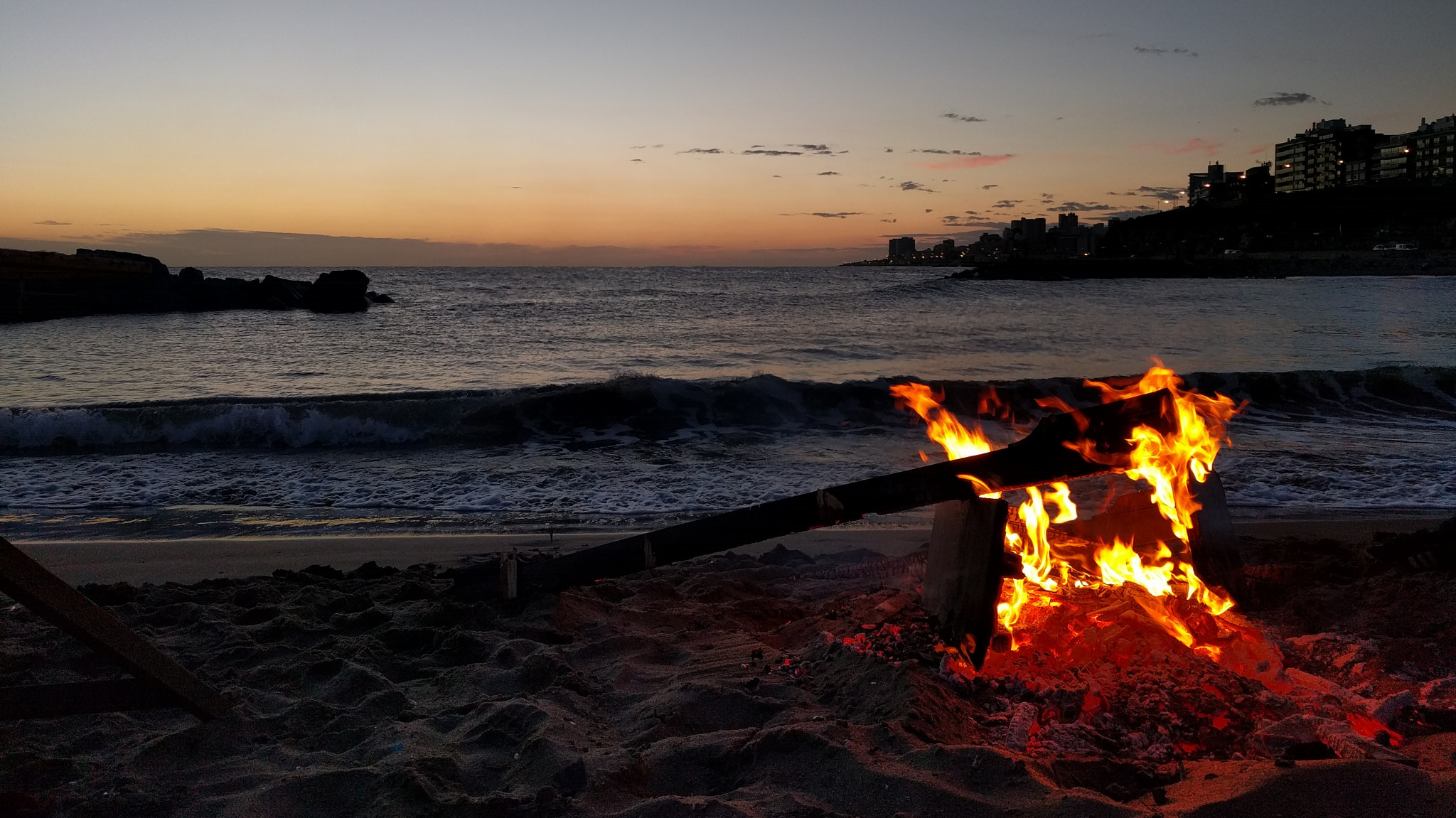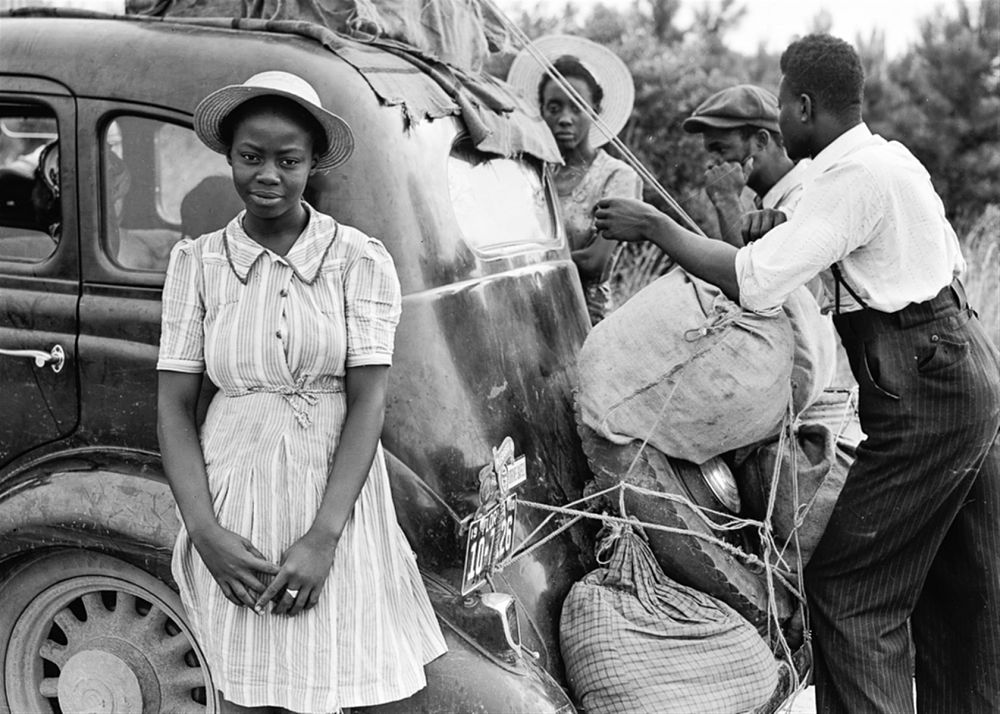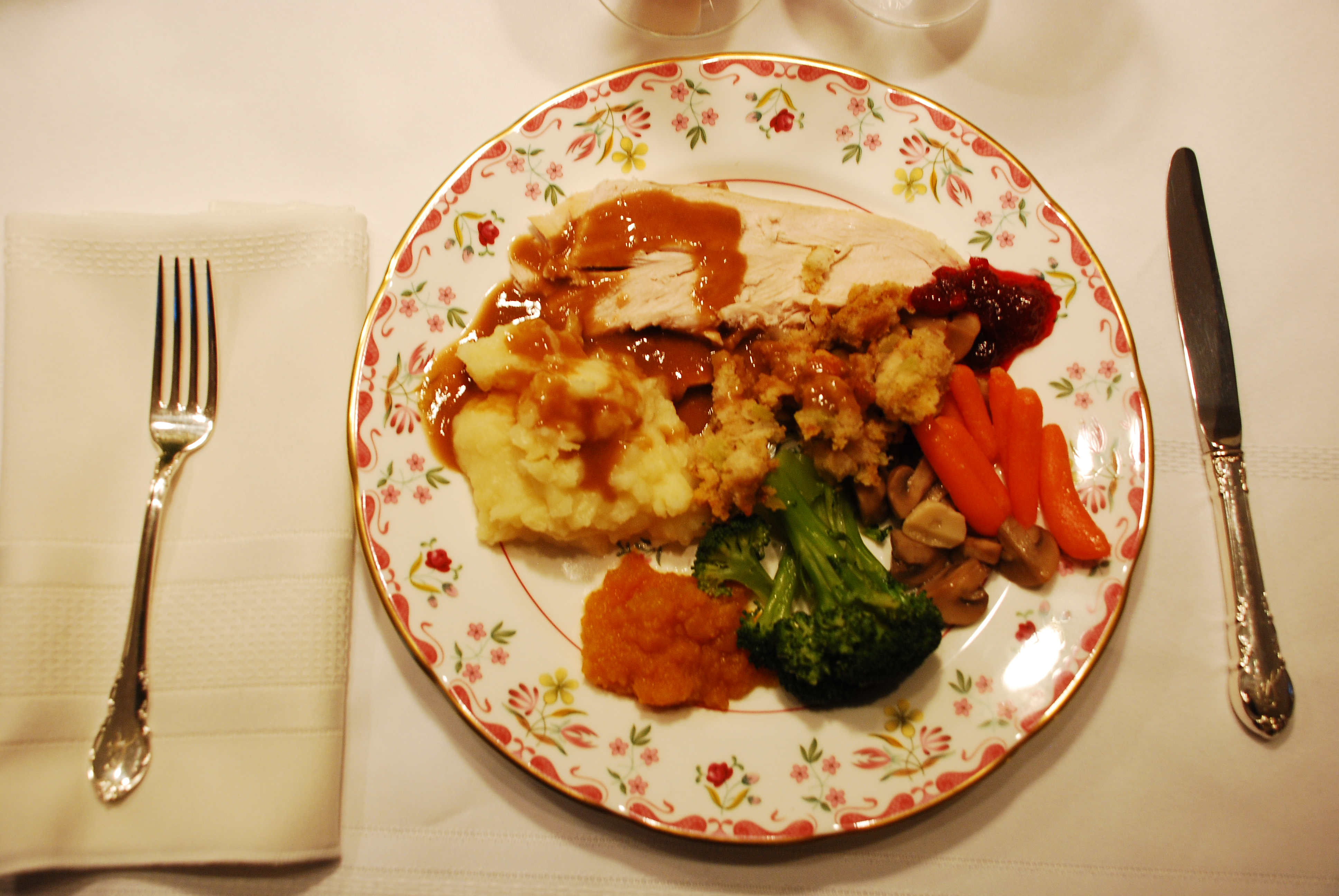I have started choking. Kung pao chicken. Rib medallions. Cheap steak. Sometimes I can wait it out, arms up, breathing deep, until the lump is gone. I can finish my meal. Sometimes I vomit. Two fingers. The tongue’s spongy heel. Last night my wife, Grace, woke up the baby to drive the three of us to the emergency room so the nurse could wake up a specialist to use her flexible camera to shove the chicken chunk deeper down my gullet. I was embarrassed and frustrated and hungry.
Food tethers me. That’s the problem. Above the plummets of new fatherhood, young marriage, short resumes. I open wide and bite at an angle—bite standing up, driving, between meetings—because the moments I am not eating, I am flagging. I am spilling the formula or rambling in front of my boss. I am looking down.
This morning my throat throbs. I shovel oatmeal. I feed Lucy who spits up half the bottle afterward in bright, syrupy strings, and wriggles in my arms like there are stones in her jumper or mud cracks up and down my arms.
“There, there,” I say.
She rasps and writhes. She blinks empty eyes. Or not empty but swollen full, stuck overflowing with a world that is always new: colors, shapes, faces, feelings. I am ashamed of how often I have to remind myself that she is not making decisions. Not choosing to wake up in the middle of the night, to cry at any movement, to spit up down my shirt. She depots forty new sensations every moment, and sometimes her face betrays each one. Me, I am making decisions.
I drop Lucy at daycare and call in sick to work. I eat a medium pepperoni pizza alone. I crave the ache, not the flavor. If I craved the flavor, I would chew. But I chase that belly strain, that bloat. How else can I feel anchored?’
Lucy learns to pull herself up on chairs and kitchen cabinets. To tip books Grace stacks on the end table. To pull the curtains down with the rods. One bruise lingers a week, a plum bump on her pale forehead. I choke on cheap steak. I cough up ciabatta. We hide cords, plug sockets, lock closets. She finds a pair of scissors and gashes her heel, stains the lemon-colored carpet in the nursery. I have to buy new work pants in the big-and-tall department.
Overeaters Anonymous reminds me there are worse compulsions. Most of the other people in the circle struggle with two or three. They gorge instead of drinking or smoking. “The self-hatred doesn’t help,” the meeting leader tells a man wiping his eyes with his sleeves. “It’s too easy.”
Celery and carrots and cauliflower, rubbery in the fluorescent lighting. Only powdered creamer and fake sugar. Over the hour, the folding chair hardens.
“It’s the new you,” someone else says. “The one you’re making. Focus on that.”
I imagine a new me without stretch marks or pores. With smaller nipples. I can focus on him if I avoid mirrors. Lucy licks mirrors. She presses her face to them and gargles some sentence I cannot understand. When I have to vomit and Grace is not home, I sit Lucy in her bouncer so I can watch her while I kneel over the toilet. Peanut butter and sourdough. Sausage and sauerkraut. “Don’t tell your mother,” I joke, but she only has a record feature, no playback, data collecting deep inside her.
You are supposed to waste food. Not you. One should. Me. I have to trash the last of the pad thai, the rest of the fries, Wednesday’s pasta if I am going to learn to live in the insecurity of dieting. Without a distended calm, I feel a slight anxious buzz with no clear worry attached to it. I am sure I could find one if I read the warnings on Lucy’s gadgets or watched the local news. Lucy eats off the floor. She finds this morning’s dropped crackers. “No, no, no,” I tell her. But it’s too late. I have to sweep more often, pay closer attention, finish childproofing the apartment. You can do what you want.
Lucy tethers us. She runs sooner than the boy her age at daycare. She signs more than the baby at the end of our block. Her hair is softer, skin clearer, eyes sharper. She talks and builds and eats more. Grace buys books about baby geniuses and toddler diets. I buy three different training toilets because each has its features. We watch Lucy choose between them, cartoon puffins coloring the living room from the flat screen, while I finish Grace’s pecan pie.
“Aren’t you proud?” she asks me when Lucy wins the Ray of Sunshine certificate at daycare at the end of her third year.
“Relieved,” I say. Every child wins a certificate—best reacher, most curious, etc.—but I tell an OA meeting that Ray of Sunshine is the only one that means multiple superlatives, most obedient and kind and fun.
We take turns alone with Lucy. I color and paint with her. Grace walks her down trails. I let her into our bed to watch TV. Grace sneaks her down to the docks so they can bob in the river.
When we met, Grace carried herself like a scythe. Anything could be cut through. If I hated tequila, she ordered us shots. If I was in a hurry to catch the bus, she sat on the ground. We found a rhythm when I learned to challenge her back, to pour the shot in her soda or catch the bus without her. We didn’t not want children when she came home with four pregnancy tests one Thursday and locked me out of the bathroom.
“This is time travel,” she said. “We jump ahead.”
The sky pinked. Cars outside collected at the light, a cocktail of radios and mufflers.
“I want what you want,” I told her.
“That’s not good enough.”
We both wrote our answers, yes or no, on the backs of junk mail and held the envelopes to our chest.
“You have to go first,” she said.
What difference would no have made? And neither was the truth. Not yes. Not no. Is it even possible? was what I wanted to write. Could this potbellied, whiskey-watering, pencil-pushing bowl cut be a parent? When the doctor held purple, wet Lucy up in the light—when she wailed—my body filled with fault lines.
Date nights cost too much. Date lunches last too long. We whisper over date beers and oven tots on the porch after Lucy is asleep. We chew and soak in the white noise through her monitor. We scroll through pictures of Lucy, letting distance or framing turn the moments at the edge much easier. Here, she had colic, but her toes are so tiny. Here, between meltdowns, she shows off new pajamas.
“Do you think meetings are still helping?” Grace asks.
“Not enough,” I say and pinch my belly.
“I don’t care about that,” Grace says. “Seriously, I mean, how are you doing with everything?”
Everything?
“You can tell me, you know.”
“Tell you what?”
“Lately, I’ve been worrying that I am dreaming about the future too often. To her being older, playing on her own more often, giving me time to myself again. I should treasure these moments.” She wants to get back to music and art and hiking. She used to drag me to the gorge and badger me into another mile or one more waterfall. In one of my favorite pictures of her, red from the sun and blurry with laughter, she moons me from a ledge a mile away. I had been watching my feet and she marched ahead.
“You shouldn’t worry about me,” I tell her. Lucy has to learn to count and run and do algebra and fill out tax forms and watch us die. I only need to lose some weight (and make peace with my body and mind). “I am handling.”
At four, Lucy loves to swear. I wear a goddamn 42 in khakis. We split waffles while Grace showers. “Chew, baby, chew,” I tell her and smear on more almond butter and pour her more milk.
“Chomp, you shit,” she says and dunks her waffle and drips all over her corduroys.
I count as I chew—eighteen, nineteen, twenty—until the food is tasteless and I have no choice but to swallow. Three, four, five—my sponsor says my relationship with food will heal as my relationship to myself heals. But I have no idea how to make that stick. I still need to finish last year’s workbook. I still hide candy in my desk.
Lucy gags. Her face flushes and her eyes plead. I tip her forward. I root with one finger. The chunk is too deep. Her look will linger with me for months, the panic, the bare need. This being, even at one or two, slapped my hands away to solve it herself, overalls for her doll, velcro on her shoes. In seconds, our whole charade is teetering.
I slap and slap and slap her back until the lump is gone. Our appetites evaporate.
After I drop her off at preschool, I call in sick to work. The diner down the block brags about the size of their chicken steak. It comes breaded and gravied, oil edging the bowl, potatoes charred, eggs slimy. I can only stomach some.
Food is a terrible tether. But so is everything. Nothing is refuge enough: not whiskey or iPhones or sex or parenting or church membership or political protesting or breakfast scrambles.
I go back and pick up Lucy. I call Grace and tell her to ditch work. The three of us make good time east of the city out to the waterfalls. In the woods, dives tower over us. You are supposed to keep children off the challenging hikes, the steep grades and thin edges. Not you. We. But those are the best views. If we toe the rim of the trail, we can see mountain walls scaled in moss and the trees rooted in cliffs. We can see the clear rush of the water below.




